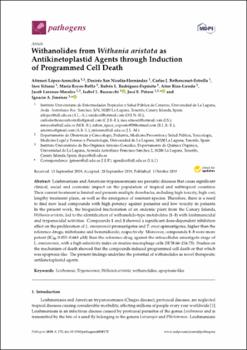Withanolides fromWithania aristata as Antikinetoplastid Agents through Induction of Programmed Cell Death
Fecha
2019Resumen
Leishmaniasis and American trypanosomiasis are parasitic diseases that cause significant
clinical, social and economic impact on the population of tropical and subtropical countries.
Their current treatment is limited and presents multiple drawbacks, including high toxicity, high cost,
lengthy treatment plans, as well as the emergence of resistant species. Therefore, there is a need
to find new lead compounds with high potency against parasites and low toxicity in patients.
In the present work, the bioguided fractionation of an endemic plant from the Canary Islands,
Withania aristata, led to the identification of withanolide-type metabolites (1–3) with leishmanicidal
and trypanocidal activities. Compounds 1 and 3 showed a significant dose-dependent inhibition
e ect on the proliferation of L. amazonensis promastigotes and T. cruzi epimastigotes, higher than the
reference drugs, miltefosine and benznidazole, respectively. Moreover, compounds 1–3 were more
potent (IC50 0.055–0.663 M) than the reference drug against the intracellular amastigote stage of
L. amazonensis, with a high selectivity index on murine macrophage cells (SI 58.66–216.73). Studies on
the mechanism of death showed that the compounds induced programmed cell death or that which
was apoptosis-like. The present findings underline the potential of withanolides as novel therapeutic
antikinetoplastid agents.






